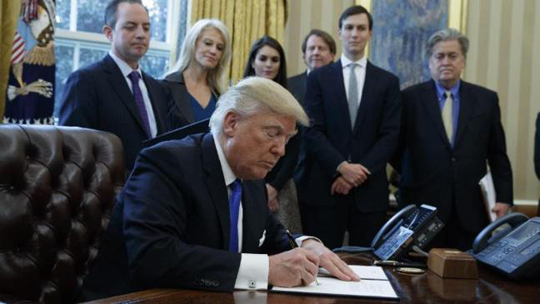Washington, Jan 26: Acting on his campaign promises, US President Donald Trump has signed two executive orders for construction of a wall along the Mexican border and speeding the deportation of undocumented immigrants even as he said "a nation without borders is not a nation".

"A nation without borders is not a nation. Beginning today, the United States of America gets back control of its borders, gets back its borders," Trump said yesterday as he signed two executive orders at the Department of Homeland Security.
"We are in the middle of a crisis on our southern border. The unprecedented surge of illegal migrants from Central America is harming both Mexico and the US and I believe the steps we will take starting right now will improve the safety in both of our countries, going to be very, very good for Mexico," Trump said.
He said the two executive orders will save thousands of lives, millions of jobs, and billions and billions of dollars.
"These two orders are part of an immigration reform we outlined during the campaign. I want to emphasise that we will be working in partnership with our friends in Mexico to improve safety and economic opportunity on both sides of the border," Trump said.
Noting that he has deep admiration for the people of Mexico, he said he greatly look forward to meeting again with his Mexican counterpart.
"I'll be doing that shortly. We will discuss close coordination on many, many important issues between our countries. This coordination includes the dismantling of cartels and keeping illegal weapons and cash from flowing out of America and into Mexico," he said.
Trump said his executive order directs federal agencies to immediately start working on construction of a border wall.
"This will also help Mexico by deterring illegal immigration from Central America and by disrupting violent cartels networks," he said.
"As I've said repeatedly to the country, we are going to get the bad ones out; the criminals and the drug deals and gangs and gang members and cartel leaders. The day is over when they can stay in our country and wreak havoc," he said.
"We are going to get them out and we're going to get them out fast and (Homeland Security Secretary) John Kelly is going to lead that wave," he added.
The other executive order, Trump said ends the policy of catch and release at the border, requires other countries to take back to their criminals, cracks down on sanctuary cities, empowers ICE (Immigration and Customs Enforcement) officers to target and remove those who pose a threat to public safety.
It also includes calls for the hiring of another 5,000 border patrol officers, calls for the tripling of the number of ICE officers.
Talking to reporters, White House Press Secretary, Sean Spicer, described this as the president "fulfilling one of his most significant campaign promises" to the American people by making America safe again, by taking steps to secure our borders and improve immigration enforcement inside the US.
The first order, he explained, is the border security and immigration enforcement improvements. It addresses long overdue border security issues and it's the first order in that will be to build a large physical barrier on the southern border.
"Building this barrier is more than just a campaign promise, it's a common sense first step to really securing our porous border. This will stem the flow of drugs, crime, illegal immigration into the US. And yes, one way or another, as the president has said before, Mexico will pay for it," he said.
The US will create more detention space for illegal immigrants along the southern border to make it easier and cheaper to detain them and return them to their country of origin.
"We're going to end the last administration's dangerous catch and release policy, which has led to the deaths of many Americans," he added.
Spicer said under the second executive order, federal agencies are going to unapologetically enforce the law, “no if's, ands or buts".
"We're gonna restore the popular and successful secure communities program, which will help ICE agents target illegal immigrants for removal," he said.
Spicer warned that the State Department is going to withhold visas and use other tools to make sure countries accept in return the criminals that came from their country.
"We'll ensure that these countries take those individuals back and we're gonna strip federal grant money from the sanctuary states and cities that harbor illegal immigrants," he said.
"The American people are no longer going to have to be forced to subsidise this disregard for our laws. Reform of our immigration system has been at the top of President Trump's priorities since he announced his candidacy," Spicer said.






Comments
Add new comment